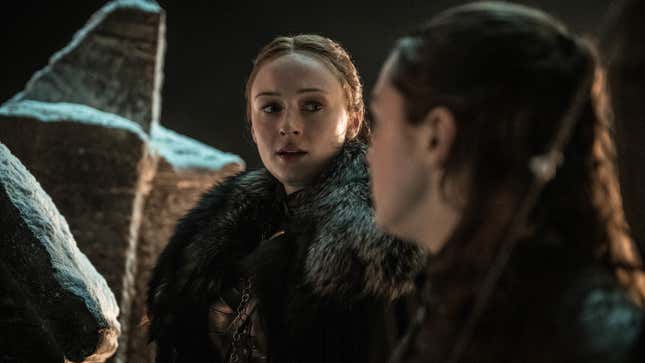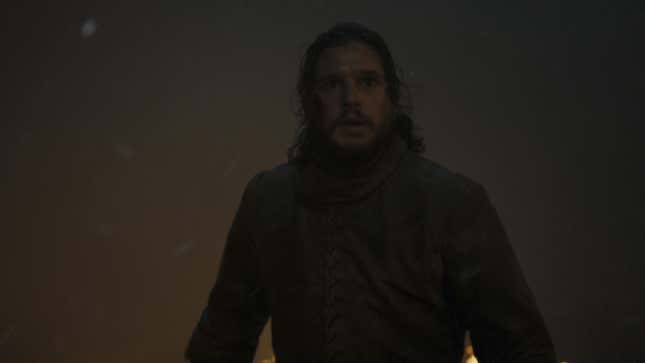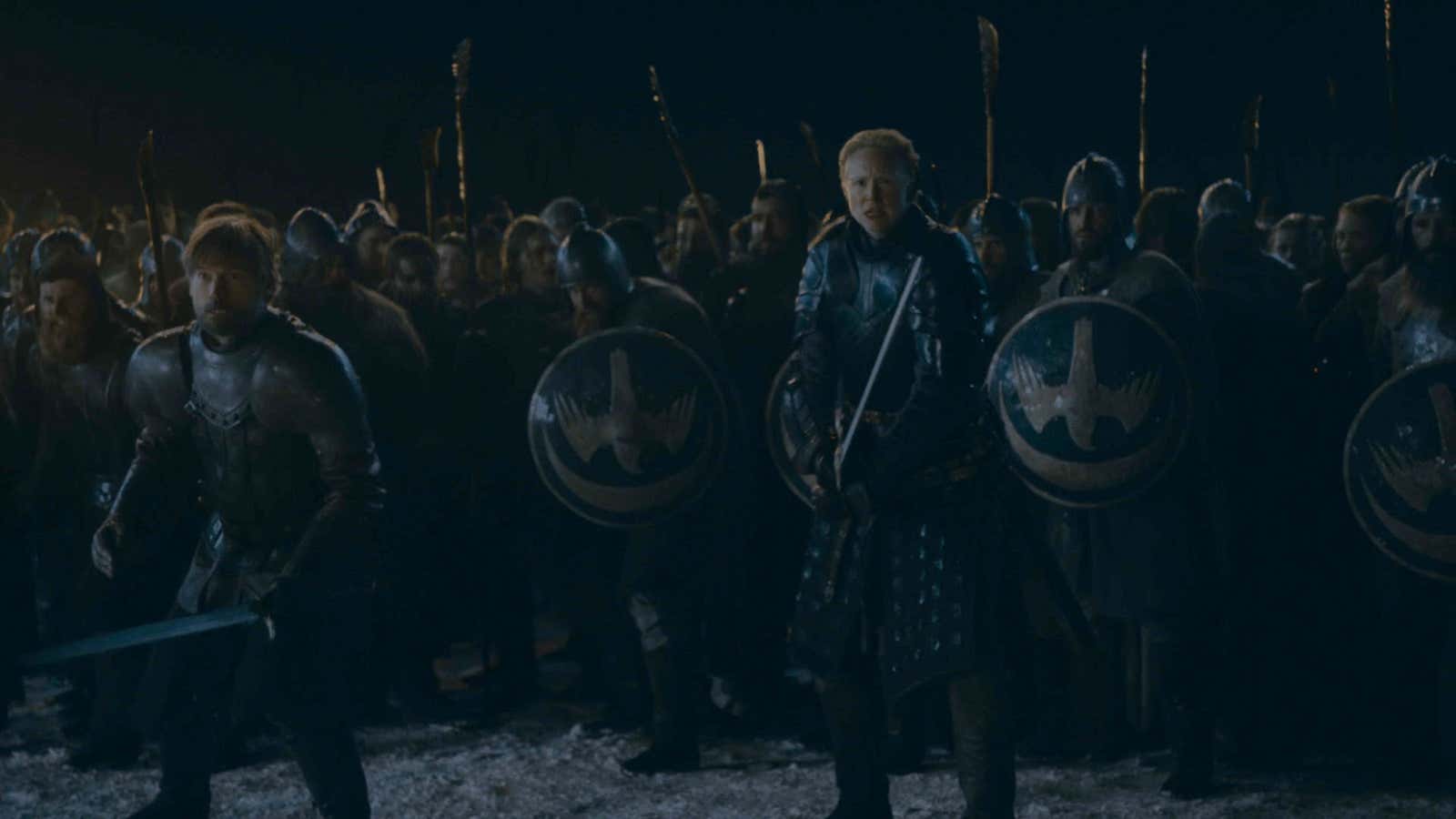Welcome to another season of Game Of Thrones reviews for those who have not read the books the series is based on. Since critics won’t be receiving screeners this season, each week I’ll publish the episode page once the broadcast ends and add my review to the page when I finish. That way newbies have a spoiler-free place to discuss the episode as soon as possible. As such, spoilers are strictly forbidden. Any spoilers in comments will be deleted on sight. Remember: Discussions of things that were different in the books or confirmations of things that won’t happen count as spoilers, too. Have you read the books and want to discuss what’s coming? That’s what our experts reviews are for.
Game Of Thrones has never shied away from being bleak. Even as the show has gotten increasingly straightforward in these later seasons, with plots that deliver far more traditional beats of the “thrilling heroics” variety, it maintains an ability to create moments of unsettling tension that sap catharsis and leave viewers squirming uncomfortably. And by that standard, “The Long Night” delivered in spades. This episode did everything but skin our heroes in front of our eyes, in terms of doing its best to emphasize just how dim the hopes were for victory. Yes, the living eventually prevailed, as we suspected they had to, but in a manner that relentlessly pummeled the audience with evidence that the answer to “At what cost?” was going to be a steep one, indeed.
And yet, given how the carnage unfolded, a surprising number of named characters survived. There are still a few unknowns, but the survey of who was left standing as the episode drew to a close was an awfully full dance card. Those names included Brienne (who the episode repeatedly seemed to indicate was going down under an onslaught of White Walkers, only to pop back up and keep swinging), Pod, Jaime, Sam, the Hound, Davos, Grey Worm, Gendry, Tormund, Dany, Jon—nearly everyone threatened with impending doom in one scene or another made it through. R.I.P. Beric Dondarrion, Dolorous Edd, Jorah Mormont, Lyanna Mormont, and Theon Greyjoy. Oh, and Melisandre, though I don’t think pulling off your age-defying necklace and walking out onto the battlefield to commit suicide after you just helped humanity to victory necessarily makes you a casualty of the Night King. That seems like it was more the Lord Of Light’s call.
If this tallying up of names feels rote, it’s only because those final scenes of the surviving members of this conflict were almost comically limited to identifiable characters. That post-battle wide shot showing a castle full of bodies and basically only Tormund, Gendry, and Grey Worm still standing was the equivalent of the show saying anyone on screen not wearing a “Hello, my name is…” tag needed to lie down and die. A bit preposterous, maybe, but the show made it more so by showcasing the sheer scale of death that surrounded all of them yet permitted these few we knew to emerge still breathing. It’s not that we needed a bigger body count of people whose names are in the credits, necessarily, but some balance with a few anonymous others would have lent more plausibility.

Honestly, a lot of what this episode did right had more to do with the scenes that surrounded the enormous melee than those hyper-edited clashes of swords. To wit: The lead-up to the battle was wonderfully done, starting with the long tracking shot that followed Sam and then Tyrion as they nervously took up their places for the fight. There was a palpable tension to the endless beats of the characters standing and waiting, craning their necks to try and see something, anything, in the murky black ahead. Like Christmas, the anticipation in some ways outstripped the payoff. That includes the sudden reappearance of Melisandre, arriving just in time to say a prayer and ignite all the Dothraki blades with fire.
Similarly, the best interruption of the continuous sensory assault was the scene of Arya being stalked in the library. It was so studied, and so terrifically tense—rather than just have her tiptoeing around, dodging white walkers, the sequence highlighted her fear and uncertainty, raising the stakes by raising her pulse. There was certainly plenty of badass Arya before and after—more on that soon—but here was Arya the living, breathing human, outnumbered and petrified of making the one slight wrong move that would doom her. Maisie Williams sold the hell out of this; each decision flickered across her face in a combination of paranoid panic and cautious wilting, from the impulsive tossing of the papers across the room to the agonizing moments sliding from bookshelf to bookshelf, unsure if the next one would put her face to face with the undead. It was nervy stuff, and lent an intimate immediacy to the stakes.
But this isn’t what this episode was meant to showcase. “The Long Night” was the big battle of the year, the thing Game Of Thrones always touts as one of its seasonal high points, and this time around it was hyped even more, thanks to the truly staggering cost and size of the installment. Rather than staging massive, elegant shots of this ambitious setup, however, there seems to have been a very intentional choice made on the part of director Miguel Sapochnik to pull in for disorienting close-up shots. With a few very cool exceptions (the lighted swords of the Dothraki charging forward into the blackness, the Unsullied digging in as the waves of White Walkers fell upon them, the pit ignited by Melisandre), the battle emphasized the fog of war—that chaotic and too-fast-to-register sense of confusion triggered by being in the middle of something too big for you to process.

It may have been effective at conveying the confusion of the situation, but it didn’t make for terribly thrilling scenes. The blurry camerawork (quite literally at times) and rapid-fire editing meant that exchanges of blows that should have been viscerally thrilling were often muddied, good for capturing the mood but not much fun to watch. Every so often a shot would emerge from the haze of conflict that lingered long enough to convey the spatial geography of the character and the current threat they were facing, and these were like manna from heaven amid the chaos of the surrounding imagery. The best of these was probably Lyanna Mormont taking out the giant, which only served to emphasize how unfortunately infrequent such moments were. Sapochnik is capable of better than this, and it’s genuinely strange to use one of the most expensive battle sequences in history as an opportunity for jarring, sometimes vague outlines of fight choreography. (The magical fog and chill that rendered everyone snowblind certainly didn’t help clarify matters.)
[Speaking of clarity, let’s talk for a second about something very boring: Standard digital resolution on TVs. If you’re like me, you’ve probably got a decent TV with 1080p, a.k.a. Full High-Definition resolution. Things generally look good—it’s no 4K, but it’s head and shoulders above even what most people were looking at 10 years ago. But this episode was not filmed in a manner friendly to how most of the audience will be watching it, which feels disappointing. The gray/black blotchiness that ran roughshod over a lot of the battle is a bummer, and makes me wonder if any consideration was given to the way this episode would be received, or if the creative team just wanted it to be as badass as it could be under optimal viewing conditions. It’s a disservice to your viewers if you have to require them to buy a fancier TV to be able to appreciate what you’re doing.]
Similarly, the dragon sequences were marred by a lack of spatial geography—Jon and Dany may have been flying blind for a good portion of their scenes, but that doesn’t mean the audience should be as well. Even at moments of dramatic conflict, such as the attack on Jon and Rhaegal by the Night King and his ice dragon, the scene was so strangely cut together that it was difficult to parse the back-and-forth. When Dany showed up to throw the Night King off his steed and send him plunging to earth, it was at least a coherent action, which the brusque dragon-grappling prior to it failed to convey.
But that’s not what people will take away from this episode. The thing we’ll all remember is Arya Stark, Supreme Badass Of The Seven Kingdoms. Not Jon Snow, not Daenerys, but the pint-size warrior who spends the first part of the fight just annihilating White Walkers one after the other, then turns out to be the one who deals the killing blow the the Night King. The scene with Melisandre hearkens back to something most viewers probably don’t remember—an exchange between the two in season three wherein the witch told the youngest Stark she was destined to kill those with “brown eyes, blue eyes, green eyes… sealed shut forever.” Combine that with the sure-to-be-iconic motto Arya inherited from her old instructor Syrio Forel about what to say when the God Of Death comes calling (“Not today”), and you’ve got a purely enjoyable, crowd-pleasing moment of victory. The petty critic in me would say the show could’ve done a better job of revealing how she got the drop on the Night King instead of just Deus Ex Arya’ing the situation, but it’s a very satisfying moment, so we’ll let it pass.
Having survived “The Long Night,” Daenerys will now be turning her attention back to the problem that originally vexed her: Cersei Lannister. It will be interesting to see how the show tries to raise the stakes of an internecine squabble between competing monarchs when compared to an existential threat to humanity’s very existence, but this series has always excelled when it goes deep on the machinations of political chicanery. There will probably be a downbeat lesson to be learned here: No one thanks you for saving the world two weeks later.
Stray observations
- Kudos for that subtle telegraphing of the subsequent exchange when Melisandre first enters Winterfell and locks eyes with Arya for an uncomfortably long time.
- A few seemed to live, but the Dothraki are pretty much wiped out, right? As are the Unsullied? Team Dany is looking a lot less impressive.
- The moments between Sansa and Tyrion were also episode high points, particularly that very sweet silent look as they’re hiding from the dead down in the crypt, acknowledging their role in each other’s journey.
- Bran isn’t having it with Theon’s apology. Everything the Greyjoy did, “brought you where you are now. Home.”
- Honestly, think back to earlier seasons: Who could’ve predicted Theon getting the hero’s end he does here?
- Good on Missandei for calling out Sansa’s Northern Pride nonsense. Yeah, if only you’d refused Daenerys’ help earlier, everyone at Winterfell could already be dead.
- Genuinely surprised by how much Sapochnik dropped the ball on the action here. I know the new Hellboy sucked, but I would’ve loved to have seen what Neil Marshall could’ve done with this material.
- Don’t worry, everyone: Ghost survived.
- For more on the episode, you can tune in tomorrow for “Winter Is Here,” the site’s new video (or audio) podcast covering the show, with Katie Rife and Caitlin PenzeyMoog. You can find all of the episodes here, or subscribe to the audio version here or wherever else you get your podcasts.
